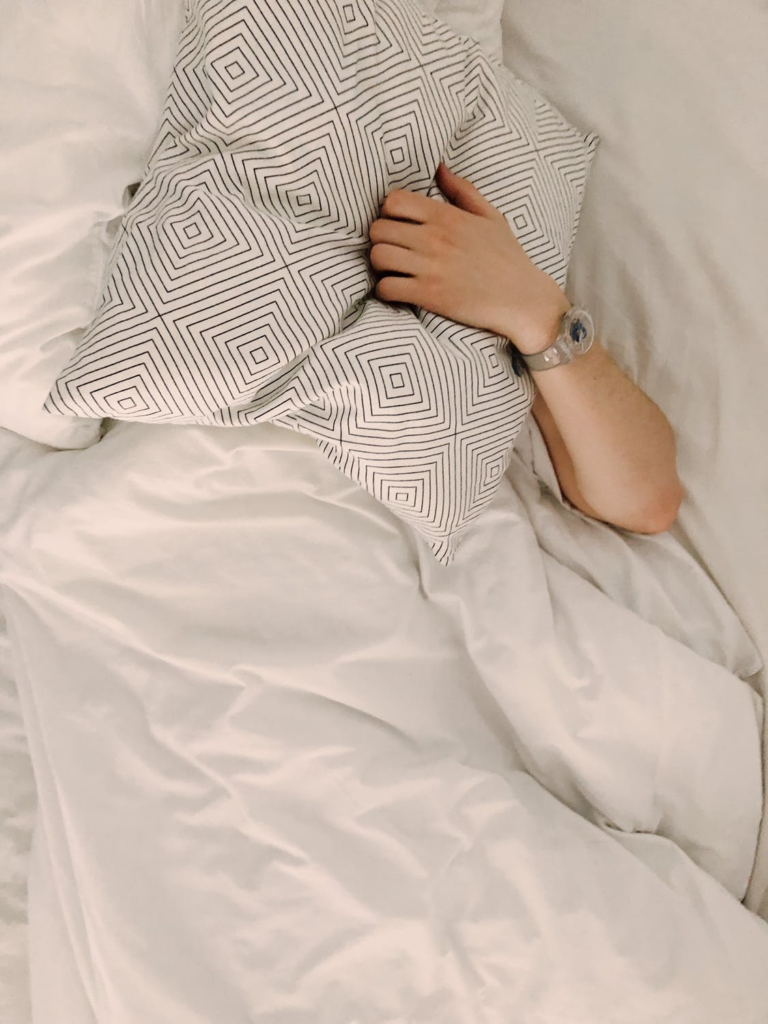If you’re waking up drenched in sweat in the middle of the night, you are likely suffering from night sweats or excessive perspiration during sleep. In fact, the question “why do I sweat in my sleep” is asked by almost half of the general population at one time or another. Studies show that night sweats are a fairly common occurrence and are usually not a sign of a serious problem.
There are several common causes of night sweats. Some, however, are more serious than others. Here are some of the most common causes of night sweats and what you can do to stop sweating.
Increased Temperature
If you’re waking up sweaty, there may be a very simple reason: too much heat. Whether you’re adding too many extra layers at night or have a sleeping partner that adds body heat, you may be sweating simply because you are too hot. This cause of night sweats is simply the body’s normal response to too much heat and is often not a sign of any other problem.
Other Signs:
- Waking up feeling hot
- Waking up cuddling with your significant other who happens to emit a lot of body heat
- Waking up with your pets sleeping next to, or on top of you and providing excess heat
The Solution
If you are sweating because you’re simply too hot, the solution is simply to cool down. If you like to go to sleep in a warm environment, try turning down the thermostat. If you know your partner or your pet provides access heat, try wearing fewer layers of clothing or use a lighter blanket. If you’re sweating during the summer, crank up the fan or air conditioner.
Fever

Being sick is never fun, but having a fever is even worse. While fevers are often associated with chills and body aches, they can also cause you to sweat during the night. This is particularly true if the fever is broken naturally or by medication while you are sleeping.
Other Signs:
A fever is often associated with chills and body aches You may use a thermometer to take your temperature and find that it is above 99 degrees Fahrenheit or 37.2 Celsius
The Solution
Keeping yourself hydrated and taking over the counter medication, such as Tylenol is a great way to relieve your fever symptoms. Since the night sweats can be a normal part of recovery in this case, it’s best to wait it out and change your sheets more often. However, if you have night sweats accompanied by high fever, it’s best to see a doctor.
Infection
Certain serious infections such as endocarditis, HIV, and tuberculosis are known to cause night sweats. Some may even present with fever only at night or fever that spikes higher at night. It may also cause cold sweats, which is where you are cold but sweating.
Other Signs:
- You will likely have a persistent fever
- You will have other signs associated with the infection
- Over the counter medications will provide little relief
The Solution
Before you get too worried, take a deep breath, and consider the likelihood that you have a serious illness. Have you been in contact with someone who has tuberculosis or another serious illness? If you think that you may have a bacterial infection, you should see a doctor as soon as possible. However, keep in mind that most healthy adults are more likely to have a bad cold than endocarditis.
Menopause or Perimenopause
If you’re a woman in her 40’s and 50’s, your night sweats may be a sign of menopause. This is a natural process that happens to all women, though some women experience this sooner than others.
Other Signs:
- Hot flashes and neck sweats
- Mood swings
- Insomnia
- Vaginal dryness and painful intercourse
Night Sweats During Your Period
Cessation of menses and you are a woman over 40. If you’re a sweating man, these do not apply.
The Solution
While menopause is a natural process, there are medications and supplements that can help alleviate night sweats and other signs of this change. Your doctor can help recommend the best course of action for your individual case. There are also natural supplements available, though you should always make sure that you are listing all medication, including any natural supplements, at your medical appointments.
Nightmares
If you’re waking up from a nightmare, you may be sweating. This is a normal reaction for your body because you’ve just experienced something that is frightening. You may also wake up in cold sweat, where you don’t feel hot, but you are still sweating.
Other Things
Waking from a bad or disturbing dream or waking up with a bad feeling about a dream but nor recalling the details of a dream can also cause night sweats.
The Solution
Occasional nightmares may be normal. However, if you are having frequent nightmares, or if you’ve recently suffered a traumatic or stressful event, you may want to see a mental health specialist.
Cancers Such as Lymphoma
While not all cancers are associated with night sweats, there are a few that do present with excess nighttime perspiration, and, among these, lymphoma is the most common. Lymphoma is a cancer of the lymphocytes, cells within the immune system that are usually used to defend the body against invaders. Lymphocytes are typically found in the lymph nodes, thymus, spleen, and bone marrow. With lymphoma, these cells proliferate out of control and cause severe problems in the body.
Other Signs
- Persistent Fever
- Fatigue that lasts for many days despite rest
- Painless swelling of lymph nodes
- Unintentional or unexplained weight loss
The Solution
If you suspect that you may have lymphoma, you’ll want to speak to your doctor as soon as possible. At that point, your doctor will ask more questions and run tests in order to determine whether you have the disease.
Medications
There are several classes of drugs that can lead to night sweats. Some of the most common sweat-inducing drugs include certain antidepressant medications, such as Effexor and Wellbutrin. Other common culprits are acetaminophen and aspirin as well as niacin, which may be prescribed for lipid disorders and even Viagra– which can be a cause of night sweats in men over 50. Certain steroid medications may also lead to flushing or night sweats
Other Signs
- You’ve recently started a new medication
- You feel flushed
- The side effect of “night sweats” or “excess sweating” is listed on your medication
The Solution
If you were prescribed the medication, do not stop without talking to your doctor. If you are taking something over the counter, you should weigh the beneficial effects of the medicine against the unpleasantness of night sweats. You can also ask your local pharmacy for advice on similar medications that would not cause sweating or flushing.
Idiopathic Hyperhidrosis
Some people tend to sweat more in general, which may translate into night sweats. Scientists aren’t quite sure what causes this phenomenon.
Other Signs
You get abnormal sweating during the day and the night sweats.
The Solution
Your doctor can recommend several treatments to help reduce sweating. In the meantime, commit to more frequent showers and change your sheets every few days will help reduce your night sweat anxiety.
Takeaways:
Why do I sweat when I sleep?
There are many reasons ranging from the temperature of the room to side effects of medication
Why does my head sweat so much?
This may be a sign of flushing, a hot flash, or simply due to your fur baby curling up on your pillow.
What are cold sweats?
This is when you don’t feel hot, but feel like you’re sweating
What causes cold sweats?
The causes can range from bacterial infection, fever, or simply a nightmare.
When to be concerned about night sweats?
If you are having other symptoms that are consistent with a serious illness such as fever, pain, or persistent cough, you want to see your doctor
Night sweat/cancer connection?
Some cancers, such as lymphoma, do cause night sweats.


